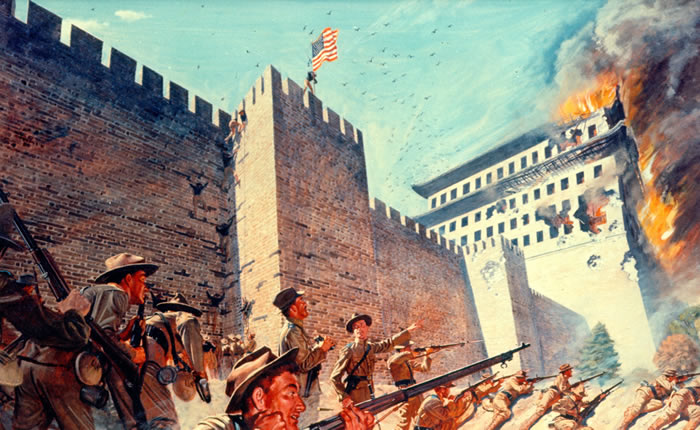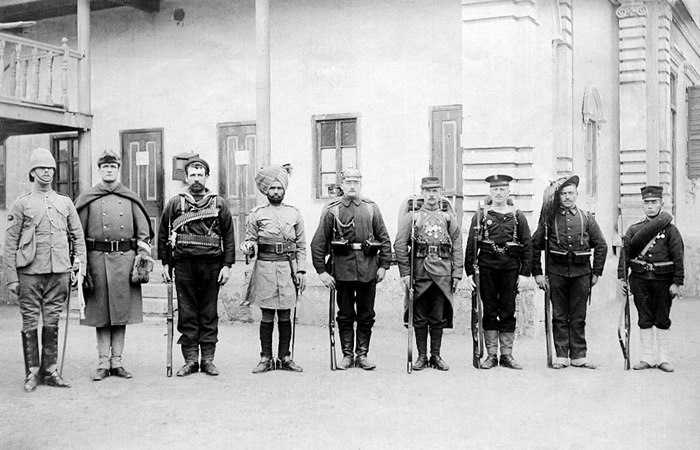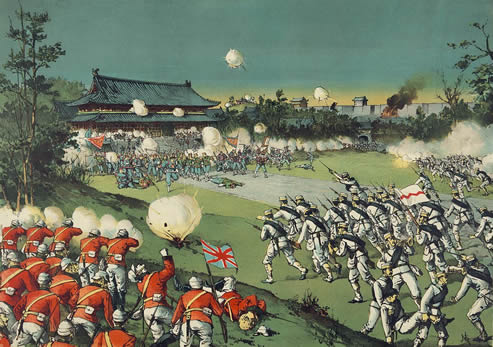 |
| American troops scale the walls of Peking, Boxer rebellion |
The Boxer Rebellion in China was the culmination of the reactionary policies of the dowager empress Cixi (Tz'u-hsi) after she crushed the reform movement of 1898 and imprisoned Emperor Guangxu (Kuang-hsu), who had advocated the thoroughgoing reforms. The defeat of the Boxers by forces of seven Western powers and Japan would bring deeper losses of sovereignty and humiliation to China and totally discredit the Qing (Ch'ing) dynasty.
The Boxer movement was rooted in half a century of Western victories over China and the unequal treaties they had imposed on the Chinese, resulting in deep popular resentment among all segments of the people. Many Chinese resented the activities of Western Christian missionaries who had been free to build churches and proselytize throughout the country and were not subject to Chinese laws.
The expansion of Western trade in China and the low tariff that they imposed made Chinese-produced goods noncompetitive against Western imports, damaging the economy. Shandong (Shantung) province was particularly hard hit by economic hardships, the result of frequent flooding of the Yellow River beginning in the 1880s.
  |
Local frustration reached a high point in 1898 due to two events: a particularly bad flooding of the Yellow River and Germany's establishment of a sphere of influence in Shandong. A Chinese secret society called the Yihe chuan (I-ho chuan), or the "Righteous and Harmonious Fists," capitalized on the popular discontent.
It was an offshoot of the White Lotus Society and the Eight-Trigram Sect, which had risen in revolt against the Qing dynasty in the late 18th century. Their members claimed magical powers through the practice of shadow boxing, charms, and magical arts. Westerners called its members Boxers because they practised martial arts.
 |
| Boxer soldiers |
The Boxers were mostly poor unemployed farmers and were initially noted for being both antiforeign and antidynastic. However, they were soon co-opted by Cixi and the powerful reactionary Manchu nobles who surrounded her, who hoped to use them to consolidate their power. They skillfully manipulated the Boxers to support the Qing and whip up xenophobia among the people.
The Boxers were initially most active in Shandong. However, acting governor Yuan Shikai (Yuan Shih-k'ai) was no fool and knew that their martial arts were no match for firearms. He defied Cixi's order to afford them protection, suppressing them and driving them out of the province.
They found a new home in Zhili and Shanxi (Shansi) provinces and were welcomed by Cixi into Beijing (Peking), where they were organized into a militia and "proved" their invulnerability to bullets by a demonstration before her with blanks. Then followed a reign of terror by the Boxers, killing Westerners, Chinese converts to Christianity, and anyone who opposed them. Cixi executed a number of officials opposed to the Boxers in the capital, thereby silencing opposition.
 |
| Troops of the Eight-Nation Alliance in 1900 |
On June 21, 1900, Cixi issued an edict declaring war against all Western nations, ordered all Chinese diplomats stationed in the West to return home, and ordered provincial governors to round up all foreigners.
She also ordered the cutting of telegraphic links between China and the outside world. Several Western diplomats were killed in the capital city, and a Boxer force besieged the Western diplomatic quarters.
Fortunately, governors in the south and eastern provinces, including the senior statesman Li Hongzhang (Li Hungchang) and Yuan Shikai, among others, jointly declared the court's declaration of war illegitimate and their intention to suppress the Boxers and protect the foreigners in their territories. Likewise, Chinese diplomats stationed in the West declared Cixi's moves illegitimate since the rightful ruler, Emperor Guangxu, was held prisoner by her.
A relief force consisting of units of Great Britain, France, Germany, Russia, Austria-Hungary, Italy, the United States, and Japan was organized and captured Beijing on August 14, lifting the siege of the diplomatic quarters because with no artillery pieces, the Boxers had been unable to capture the sandbagged buildings that held the diplomats, Western missionaries, and Chinese Christians inside.
 |
| The Fall of the Peking Castle |
Meanwhile, Cixi, her nephew the captive emperor, and her supporters had fled Beijing disguised as farmers. The city and environs were subjected to severe destruction and looting by the conquering soldiers.
Diplomats of the eight powers then negotiated terms among themselves to dictate to China. The Boxer Protocol (1900) had 12 clauses: official apologies, punishment of the guilty, suppression of antiforeign organizations, no civil service examinations to be held in provinces that supported Boxer activities, the demolition of Chinese forts at Taku (that controlled entry to Beijing by sea), no import of arms by China for two years, the Western powers to be able to garrison troops at designated points in northern China and to fortify their diplomatic quarters, the abolition of the Zongli
Yamen (Tsungli Yamen) that had conducted Chinese foreign affairs since 1862 (to be supplanted by a new ministry of foreign affairs), and an indemnity of 450 million gold taels (1 tael=1 1/3 ounces) to be paid over 40 years. China was not represented at the negotiations and was not permitted to change a word in the protocol.
 |
| Japanese executing Boxers as Indian and Japanese troops look on |
Li Hongzhang was appointed head of the delegation to offer apologies to the Western powers—he died soon after completing the task. Allied soldiers evacuated Beijing in September 1901. Cixi returned to Beijing in 1902 and issued a proclamation blaming Guangxu for all that had happened.
The Boxer Rebellion was propelled by popular anger against Western imperialism that was manipulated by an ignorant and reactionary court headed by Cixi. Both the Boxers and Western troops caused terrible suffering among innocent people, the inevitable collapse of the Boxer Rebellion plunged China's existence into jeopardy, and ultimately it spelled the death knell of the Qing dynasty.